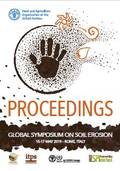Publicationes
Proceedings of the Global Symposium on Soil Erosion
The proceedings book of the GSER19 contains all papers presented both orally and in poster format during the symposium. The papers have provided sufficient scientific evidence to show that soil erosion is a global threat to food production systems, rural livelihoods, human health and biodiversity, and that coordinated action needs to be fostered and accelerated to address this issue.
Global Symposium on Soil Erosion: Outcome Document
The Outcome Document of the GSER 19 highlights scientific evidence on the status of soil erosion, its impacts and the agenda for action in the framework of achieving the SDGs. The document also provides recommendations for developing sound environmental policies and programmes to encourage the use of sustainable soil erosion control practices.
Soil erosion: the Greatest Challenge for Sustainable Soil Management
Despite almost a century of research and extension efforts, soil erosion continues to be the greatest threat to soil health and soil ecosystem services in many regions of the world. Our understanding of the physical processes of erosion and the controls on those processes has been firmly established. Nevertheless, some elements remain controversial.
Soil loss Atlas of Malawi
With over three-quarters of the country’s soils at risk, soil loss in Malawi represents a major threat to food security and nutrition, agricultural growth, the provision of ecosystem services and the achievement of the SDGs. Since the Malawian economy is highly dependent on agriculture, soil loss is a significant hindrance to the overall economic development of the country.
Código Internacional de Conducta para el Uso y Manejo de Fertilizantes
Código para Fertilizantes se elaboró para aumentar la inocuidad alimentaria y el uso seguro de los fertilizantes. El Código de Fertilizantes tiene por objeto abordar cuestiones de importancia mundial, contribuyendo así a la consecución de algunos de los Objetivos de Desarrollo Sostenible (SGD).
Soil and nutrients loss in Malawi: an economic assessment
Soil loss is a major threat to agricultural development in Malawi, and the size of the agricultural sector in the Malawian economy renders it a major limitation to the overall economic development of the country. Soil loss reduces cultivable soil depth, but also takes away fertile soils from farmlands. The net effect is a loss of agricultural productivity, increased expenditure on fertilizers, and a general decline in profitability of crop production.
Status of the World's Soil Resources
Main report
The SWSR is a reference document on the status of global soil resources that provides regional assessments of soil change. The information is based on peer-reviewed scientific literature, complemented with expert knowledge and project outputs. It provides a description and a ranking of ten major soil threats that endanger ecosystem functions, goods and services globally and in each region separately.
Directrices voluntarias para la gestión sostenible de los suelos
Las Directrices fueron adoptadas en la cuarta reunión de la asamblea Plenaria de la AMS (Roma, 25 de mayo de 2016), aprobadas en el 25º período de sesiones del Comité de Agricultura de la FAO (Roma, 28 de septiembre de 2016) y, por último, refrendadas en el 155º período de sesiones del Consejo de la FAO (Roma, 5 de diciembre de 2016).
Las Directrices voluntarias para la gestión sostenible de los suelos (las Directrices voluntarias) se elaboraron a través de un proceso incluyente en el marco de la Alianza mundial sobre los suelos (AMS). Pretenden ser un documento de referencia al formular recomendaciones en materia de políticas técnicas y generales sobre la gestión sostenible de los suelos (GSS) para una amplia gama de partes interesadas comprometidas.
Carta Mundial de los Suelos Revisada
Los suelos saludables son un requisito previo básico para satisfacer las diversas necesidades de alimentos, biomasa (energía), fibra, forraje y otros productos, y para garantizar la prestación de los servicios ecosistémicos esenciales en todas las regiones del mundo. Sin embargo, la humanidad se enfrenta a presiones sin precedentes sobre el recurso suelo. En particular, diversos tipos de degradación -incluyendo el sellado debido a la rápida urbanización- está haciendo pagar un elevado peaje, amenazando la seguridad alimentaria y el equilibrio ecológico.
Use of 137Cs for soil erosion assessment
Soil erosion is the most destructive land degradation process causing removal of soil, siltation of water reservoirs and pollution of water sources. Combating erosion needs reliable data on soil erosion rates, its dynamics and spatial distribution. Collecting such data with conventional methods requires great investment and long period of time. The 137Cs method for erosion assessment can address this problem.










